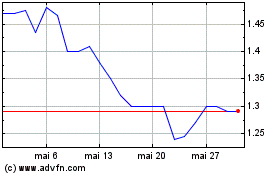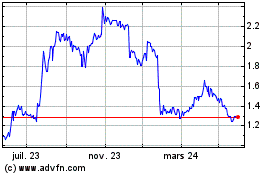- End of double-blind, placebo-controlled phase 1 trial with
OPM-101: 104 healthy volunteers (VS) participated in this trial
designed to assess the safety of OPM-101 in humans
- Very good safety profile of OPM-101: no serious
treatment-related adverse events occurred, and no discontinuation
of the study was necessary
- Oral administration of OPM-101 demonstrated dose-related
increases in systemic exposure, fast absorption with a Tmax of 2-4
hours; the mean terminal elimination half-life was 12-13 hours,
with steady state reached after 3-4 days
- Strong pharmacological effect: in an ex vivo whole blood
assay to stimulate production of TNFa, OPM-101 rapidly and
completely inhibited the stimulated release of TNFa, a downstream
marker of activation of the RIPK2 pathway
- Strong semi-maximal inhibitory plasma concentration (≥80%):
inhibition of TNFa release estimated at 150 ng/mL. These
concentrations were reached and maintained during 14 days of
administration for the 2 highest doses of MAD
- The favorable safety, pharmacokinetics and pharmacodynamics
of OPM-101 support its further development for the treatment of
diseases caused by deregulation of the RIPK2 kinase pathway, the
therapeutic target of OPM-101
- Start of phase 1b/2a clinical trial planned for the fourth
quarter of 2024
Regulatory News:
Oncodesign Precision Medicine (OPM) (ISIN: FR001400CM63;
Mnemonic: ALOPM), a biopharmaceutical company specializing in
precision medicine for the treatment of resistant and metastatic
cancers, today announced positive results of phase 1 trial testing
the drug candidate OPM-101, administered orally in single ascending
doses (SAD) and multiple ascending doses (MAD), in
healthy volunteers (HV).
OPM-101 is an experimental, powerful and selective small
molecule inhibitor of the RIPK2 kinase. OPM-101 is designed to
modulate the pro-inflammatory signal transmission pathway of this
kinase, which is responsible for the development of inflammatory
diseases, and has the potential to treat diseases in the fields of
IBD (Chronic Inflammatory Bowel Disease) and immuno-oncology. RIPK2
is a key protein in the regulation of immune responses and
inflammatory processes. Recent research highlighted its potential
as a therapeutic target, both in chronic inflammatory disorders and
in several types of cancer.
This randomized, double-blind, placebo-controlled phase 1 study
was designed to evaluate the safety, tolerability, pharmacokinetics
and pharmacodynamics of OPM-101 (EudraCT: 2022-003122-50) in 104
healthy volunteers (78 HV with OPM-101 and 26 with placebo):
- In the SAD part of the trial, 72 HV (mean age = 34 years)
received a single oral dose of placebo or 5, 20, 60, 150, 300, 600
or 1,000 mg of OPM-101, with one cohort dedicated to the high-fat
meal effect and another to the gender effect.
- In the MAD part of the trial, 32 HV (mean age = 36 years)
received an oral dose of 75, 150 or 300 mg of OPM-101 or placebo
twice daily for 14 consecutive days, including a cohort dedicated
to the gender effect.
This phase 1 trial, which began in February 2023, was completed
on schedule in June 2024.
The results of the SAD and MAD administrations in the clinical
trial demonstrated that OPM-101 is well tolerated and significantly
inhibits the RIPK2 pathway at doses as low as 60 mg single
administration and 75 mg b.i.d. (bis in die - Twice daily). Target
engagement kinetics and pharmacodynamic results showed a fast
development of inhibitory effect, already observed 2 to 4 hours
after the first administration, and inhibition maintained for 14
days of administration. The mean level of target engagement was 65%
(75 mg b.i.d), 75% (150 mg b.i.d) and 85% (300 mg b.i.d) over the
14 days of treatment.
Safety evaluations (vital signs, blood tests, ECG, holters) were
carried out regularly throughout the trial. The trial also collects
secondary pharmacokinetic measures, including half-life
assessments. Exploratory measures to assess OPM-101 target
engagement were calculated by tracking changes from baseline in
L18-MDP-stimulated TNFα production ex-vivo in whole blood
samples.
The results of the MAD cohorts demonstrated maximum target
engagement by OPM-101, demonstrated by a 90 to 100% reduction in
TNFα production, leading to complete inhibition of stimulated
production and a return to basal levels of TNFα, thus showing
immunomodulation rather than total suppression of immunity as
observed with other IBD treatments. This maximum engagement of the
target was observed, depending on the dose, between 2 and 6 hours
after the first administration of the treatment. Residual target
engagement prior to the next dose was maintained over the 14 days
of administration at mean levels of 65%, 75% and 85% with the 3
dose levels tested in MAD, respectively.
Involvement of the target in the MAD part of the study
(inhibition of TNFα production induced by L18-MDP, in % of
predose)
In the MAD part of the study, on Day 15, i.e., 24 hours after
the last administration, 50%, 55% and 80% of target engagement were
still observed in the three doses of MAD tested. At 48 hours after
the last administration, target engagement levels gradually
decreased as expected. These results demonstrate time- and
dose-dependent target engagement. These proof-of-concept results
for the immunomodulatory mechanism were obtained with oral
administration of OPM-101 for 14 consecutive days, which was also
generally well tolerated in all SAD and MAD cohorts.
No serious adverse event was reported. All treatment-emergent
adverse events considered to be at least possibly related to the
drug and the study were mild to moderate in both the SAD and MAD
cohorts. Twelve healthy volunteers (15%) reported a total of 15
adverse events considered to be related to OPM-101. 80% of these
events were mild and 20% moderate. There was no clinically
significant change in safety-related laboratory tests reported
during the treatment periods for all dose cohorts of OPM-101
included in the analysis, except for one volunteer who experienced
a moderate (3N) increase in ALT (liver enzyme) during MAD,
resulting in discontinuation of treatment after 12 days.
The pharmacokinetic results in the MAD part are consistent with
those observed in the SAD part of the study. The main
pharmacokinetic characteristics of OPM-101 are: fast absorption
with a Tmax observed between 2-4h, a terminal half-life estimated
at 12-13h, a steady state reached after 3-4 days and a
dose-dependent exposure.
On the basis of the PK/PD correlation determined from the
results of the SAD part of the study, we anticipate that a very
significant target engagement (≥80%) can be achieved and maintained
with a plasma concentration of OPM-101 remaining above 150 ng/mL in
the interval between 2 treatment administrations. This threshold
was achieved with the 2nd and 3rd dose levels in the MAD part of
the study.
OPM plans to present additional results from the phase 1 cohorts
at a future medical meeting in Q4 2024, subject to acceptance of
the abstract by the United European Gastroenterology Week (UEGW)
organizing committee.
Based on the results presented today, OPM plans to initiate
enrolment in a phase 1b/2a clinical trial in the fourth quarter of
2024.
"We are very pleased with the progress and results of this
clinical trial with OPM-101, which provided convincing results for
all primary, secondary and exploratory endpoints included in this
study," said Philippe Genne, Chief Executive Officer of OPM.
"We are pleased to demonstrate the safety of our candidate and the
strong PK/PD correlation that exists. High target engagement is
demonstrated at tolerated doses of OPM-101 throughout the treatment
period. The modulation of TNFα production ex vivo can be considered
as a key biomarker of target engagement for future clinical trials.
The clinical results reported today not only highlight the
consistency with the immunomodulatory effect of OPM-101 observed in
preclinical studies, but also validate OPM-101 as a safe and
effective inhibitor of the RIPK2 pathway. We are currently in the
process of identifying with our clinical experts the first clinical
indication that we will explore in a phase 1b/2a study before the
end of the year in order to provide a first clinical proof of
concept in a patient population capable of generating significant
added value for our asset".
"These results validate OPM-101 as a highly specific, effective
and well-tolerated inhibitor of the RIPK2 immune pathway," added
Jan Hoflack, Deputy CEO and Chief Scientific Officer of OPM.
"The field related to this therapeutic approach is currently
booming with new high quality preclinical and clinical scientific
publications mentioning a potential role for an inhibitor like
OPM-101 in multiple immuno-oncology indications, in addition to the
already well-established rational for the treatment of IBD and
other inflammatory diseases. Our team is currently working to
validate the different therapeutic options available for OPM-101,
with the aim of launching a proof-of-concept clinical trial in
relevant patients rapidly and efficiently before the end of the
year. The current idea of a safe and effective RIPK2 inhibitor like
OPM-101 suggests significant potential in both IBD and
immuno-oncology, two of today's largest pharmaceutical markets with
significant unmet needs".
About Oncodesign Precision Medicine (OPM)
Oncodesign Precision Medicine (OPM), founded in 2022, is a
biopharmaceutical company specializing in precision medicine,
dedicated to the discovery of treatments for resistant and
metastatic cancers.
OPM currently has two kinase inhibitors in clinical trials:
OPM-101, for the treatment of chronic immuno-inflammatory digestive
diseases, which demonstrated a significant therapeutic margin and
lack of toxicity in phase I trials with healthy volunteers, with a
phase Ib/IIa scheduled to start at the end of 2024. OPM-201,
licensed to Servier for the treatment of Parkinson's disease,
completed its phase I trial in healthy volunteers this year, with
phase II scheduled to start in 2025.
Finally, a third kinase inhibitor, OPM-102, targeting oncology,
is in preclinical development.
These three molecules come from the Nanocyclix® technology
platform, which enables the design and selection of small
macrocyclic kinase inhibitors that are highly effective and
selective. We now have 12,000 such molecules in our library and
will be using AI to accelerate the discovery of drug candidates
while reducing the cost of this phase.
OPM's two other technology platforms are:
- OncoSNIPER, for the selection of therapeutic targets using
artificial intelligence, in partnership with Servier for the search
of targets in pancreatic cancer,
- PROMETHE® for the design and selection of radiolabeled
biological molecules for systemic radioligand therapies, for which
we are currently discussing partnerships with vectorization
companies. The current agreement is a result of these
discussions.
OPM, co-founded by Philippe Genne, Jan Hoflack and Karine
Lignel, is based in Dijon, in the heart of the university and
hospital cluster, and has 20 employees.
Further information: oncodesign.com
View source
version on businesswire.com: https://www.businesswire.com/news/home/20240716383935/en/
OPM Karine Lignel Deputy General Manager Tel: +33 (0)3 80
78 41 93 investisseurs@oncodesign.com
NewCap Investor Relations Mathilde Bohin / Alban Dufumier
Tel: +33 (0)1 44 71 94 95 oncodesign@newcap.eu
NewCap Media Relations Arthur Rouillé Tel: +33 (0)1 44 71
00 15 oncodesign@newcap.eu
Oncodesign Precision Med... (EU:ALOPM)
Graphique Historique de l'Action
De Nov 2024 à Déc 2024

Oncodesign Precision Med... (EU:ALOPM)
Graphique Historique de l'Action
De Déc 2023 à Déc 2024
